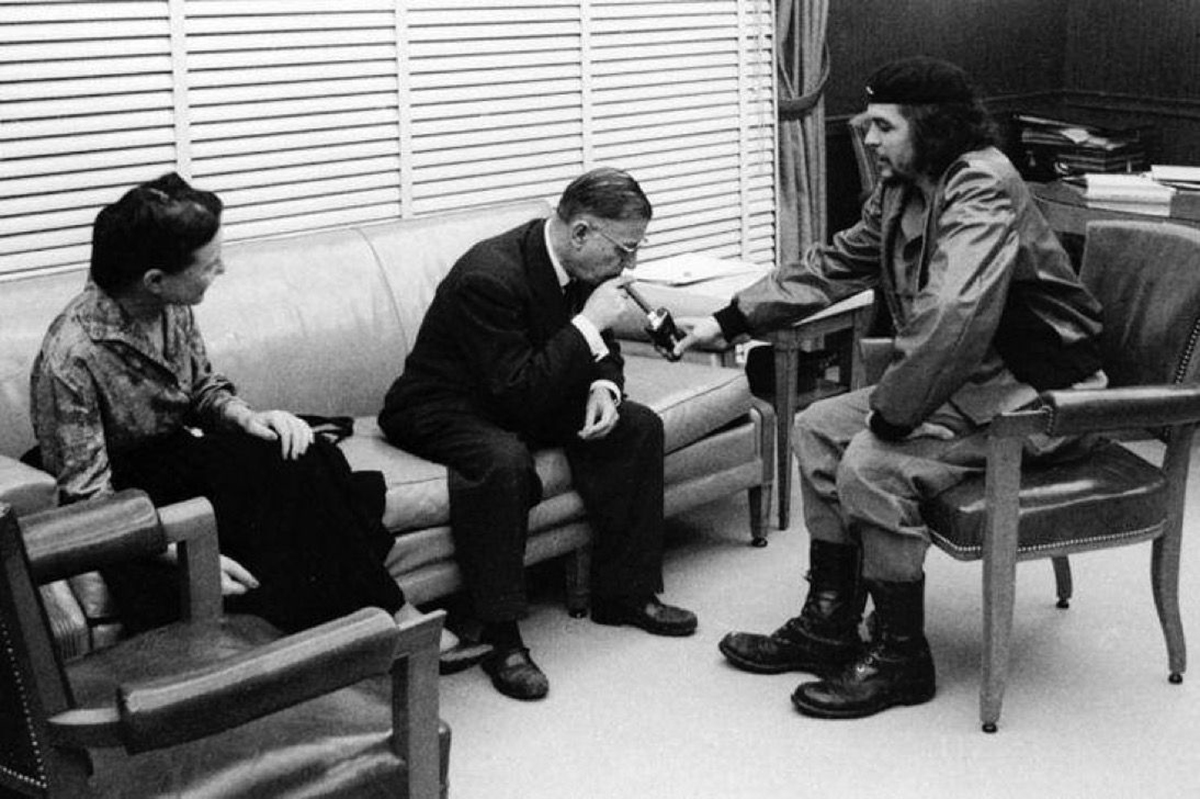Top Stories
'Anti-Imperialism' and Apologetics for Murder
The anti-imperialist Left’s mistake has not always been its opposition to Western policies, it has been its reflexive idealisation of the West’s opponents.

A consistent feature of the British socialist Jeremy Corbyn’s Labour Party has been support for Islamists and Third World dictators. Corbyn himself has dined with his “friends” in Hamas and Hezbollah, and saluted the Venezuelan strongman Nicolas Maduro. Andrew Murray, one of his consultants, is a sympathiser with the Juche regime in North Korea. Yasmine Dar, a member of Labour’s National Executive Committee, is an admirer of the Ayatollah Khomeini. Chris Williamson MP, Corbyn’s longtime supporter and friend, is a big fan of the Castroite regime in Cuba. And Seumas Milne, Corbyn’s Director of Strategy and Communications, was formerly a Guardian columnist, of whom the leftist commentator Brian Whitaker once wrote:
[Milne] views international politics almost entirely through an anti-imperialist lens. That, in turn, leads to a sympathetic view of those dictatorial regimes which characterise themselves as anti-imperialist. It’s the same with Islamist movements where they oppose Western-backed regimes…
To understand this curious phenomenon it is necessary to return to the West after World War Two.
First World Failure, and Third World Hope
By the end of World War Two, Western communists had all but abandoned hope in Western revolution. Soviet communism was an obvious catastrophe and Franklin D. Roosevelt and Clement Attlee’s reforms in the US and Britain had stripped more radical leftists of their support base. France and Italy, perhaps, offered more potential for the Left but, even there, communists tended to evolve into mainstream social democrats. And so radical leftists refocused their energies on cultural activism in their own nations and anti-imperialist activities abroad.
By this time, the European empires had all but collapsed. There was little hope for them, and nor should there have been. Burgeoning independence movements were becoming popular, and horrifying events such as the Bengal Famine had done much to discredit European rule. A bipolar world order emerged, with the United States as the most powerful Western force in international affairs. Rather than engaging in explicit empire-building it tended instead to support sympathetic governments against the Soviet Union and its communist allies. Leftists had, it must be said, justifiable complaints with this. The US propped up unambiguously appalling tyrants in Guatemala and Indonesia and entangled itself in a disastrous and brutal war in Vietnam. More recently, leftists correctly opposed the hubristic interventionist recklessness that led to the horrors of Iraq.
The anti-imperialist Left’s mistake has not always been its opposition to Western policies, it has been its reflexive idealisation of the West’s opponents. To some extent, one can explain this as a consequence of an instinctive sympathy with the underdog. With the exception of the Soviet Union, opponents of the United States and other Western powers have been comparatively poor and weak, and dependent on resilience and resourcefulness.

The problem, as anybody who has owned dogs knows, is that small dogs can be at least as vicious as their larger cousins, and that they can also bully dogs who are smaller than themselves. The veteran left-wing journalist John Pilger was moved to rhetorical tears by the “poorly armed, audacious” Iraqi “resistance,” but neglected to notice that their homemade bombs were eviscerating civilians in mosques and marketplaces as well as the American, British, and Iraqi soldiers he believed were legitimate targets.
But compassion for the oppressed is not sufficient to explain this odd phenomenon. There are people on the Left who believe that revolutionary movements in the Third World are not just underdogs but saviours—more committed, more courageous, and more principled than the old, weak, pampered liberal capitalist West.
Theirs was a romantic and revolutionary ideology that drew heavily upon Frantz Fanon’s 1961 book The Wretched of the Earth. Born in the Caribbean island of Martinique, Fanon became a fierce opponent of European imperialism and an advocate of pan-African struggle. In the conclusion of his book, Fanon wrote:
Leave this Europe where they are never done talking of Man, yet murder men everywhere they find them, at the corner of every one of their own streets, in all the corners of the globe. For centuries they have stifled almost the whole of humanity in the name of a so-called spiritual experience.
Of course, Europeans visited terrible atrocities on African, Asian, and American peoples, as well as on one another. But this simple-minded Manichean worldview cannot accommodate the Muslim conquests, the Arabic slave trade, or the Empire of Japan. Inhumanity and imperialism were universal afflictions and by no means the preserve of Europeans.

In his famous preface to Fanon’s book, the existentialist philosopher, august essayist, Soviet apologist, and sex pest Jean-Paul Sartre rhapsodised about the anti-colonial energies of Fanon and the movements he represented. “Europeans,” he wrote:
…you must open this book and enter into it. After a few steps in the darkness you will see strangers gathered around a fire; come close, and listen, for they are talking of the destiny they will mete out to your trading-centres and to the hired soldiers who defend them. They will see you, perhaps, but they will go on talking among themselves, without even lowering their voices…Now, at a respectful distance, it is you who will feel furtive, nightbound and perished with cold. Turn and turn about; in these shadows from whence a new dawn will break, it is you who are the zombies.
Westerners, among whom Sartre’s ideological predecessors had attempted to stoke revolution, were complicit to a man. Even if you had never owned slaves or defended imperialism, “your passivity [served] only to place you in the ranks of the oppressors.” “We were men at his expense,” Sartre sighed, of these “strangers,” “he makes himself a man at ours: a different man; of higher quality.”
Anyone familiar with post-colonial discourse will know the term ‘othering,’ which, in general, refers to attempts to portray minorities as strange, menacing, and defective. Sartre indulged in a different kind of othering. Third World people were mysterious, dignified, and pure, not just different from but, in a collective sense, better than their European peers. Redemption for this “fat, pale continent” could only emerge out of the fire of anti-colonial revolution. “We made history,” Sartre wrote, “and now it is being made of us.”
‘Third-worldism’ became a beacon of hope for Western leftists, who watched Marxism flourish on distant continents. It also a became a source of self-aggrandisement for Marxist revolutionaries in the Third World. They could succeed where Europeans had not. “Since World War II,” the Chinese communist Lin Biao declared in 1965:
…the proletarian revolutionary movement has for various reasons been temporarily held back in the North American and West European capitalist countries, while the people’s revolutionary movement in Asia, Africa, and Latin America has been growing vigorously… In the final analysis, the whole cause of world revolution hinges on the revolutionary struggles of the Asian, African, and Latin American peoples who make up the overwhelming majority of the world’s population. The socialist countries should regard it as their internationalist duty to support the people’s revolutionary struggles in Asia, Africa, and Latin America.
Exactly why the “proletarian revolutionary movement” had been “held back” in the U.S. and Western Europe was a question Biao evaded. Rising living standards in mixed economies? Knowledge of the catastrophic failure of Soviet communism? No. It could not be that. Such theories cast the Maoist project into doubt. Much better to scoop up their baton and run with it, and many Western leftists were delighted to see it taken.
Had they grasped that the failure of Marxism in the West was the failure of their ideas they might have been in a position to warn their Third World comrades not to follow the same path. It was not to be. The West, for them, had failed their ideas, and they sat back and watched as they were instituted in Africa, Asia, and South and Central America, marvelling at far-flung revolutionary movements even as, in many cases, they descended into chaos and oppression.
Spectators to Terror
Sartre—having soured, at least to some extent, on the Soviets— was keen to find inspiration abroad. He met Che Guevara and Fidel Castro in Cuba and was enthusiastic about their new regime. “For the first time in our lives,” his partner Simone De Beauvoir wrote, “We were witnessing happiness that had been attained through violence.” Both of them had lived through the liberation of France, which, through violence, had attained some degree of happiness. Still, the liberators had been capitalists.
In 1971, Sartre appealed to Castro to free an imprisoned poet and found himself accused of being a “bourgeois liberal gentleman” and “two-bit agent of colonialism.” He begged Castro to spare Cuba from “Stalinism” but his pleas fell on deaf ears. Perhaps he felt “furtive, nightbound and perished with cold” as the logic of his preface to The Wretched of the Earth was turned against him.
Leftist infatuation with distant communists could be more devastating. In 1975, the communists of the Khmer Rouge won the Cambodian Civil War and seized power, immediately instituting an enormous plan for agricultural collectivism. The Cambodian-American academic Sophal Ear has written of how Western Marxists were attracted by these ambitious and optimistic policies. Autarkic development, he writes:
…cast a spell on young, idealistic students who had grown increasingly critical of the ‘neo-colonial world,’ in their words. As they looked elsewhere for space to forge ahead, their eyes stopped on Cambodia, where a fresh revolution had taken place, and its charming leaders had closed the country to the rest of the world. They were in love.
Ear documents how Western academics like Laura Summers whitewashed the Khmer Rouge, twisting every warning sign of their murderous ambitions into positive features of their regime. Few Cambodians had left the country, Summers wrote, implying that its conditions were so favourable that no one wanted to leave. Unmentioned was the fact emigration was prohibited. Malcolm Caldwell, a British academic, was even more enthusiastic about the Khmer Rouge. He travelled to Cambodia to meet the objects of his admiration and was promptly and mysteriously murdered by them, joining up to three million other victims.

Perhaps the strangest case of academic attraction to Third World revolutionaries was Michel Foucault’s dalliance with Khomeini. Despite his radical libertinism, Foucault somehow esteemed this most severe of clerics, calling him an “old saint” and referring to “the love that everyone [in Iran] individually feels for him.” For Foucault, wrote Janet Afary and Kevin B. Anderson in Foucault and the Iranian Revolution, Khomeini’s uprising was:
…”perhaps the first great insurrection against global systems, the form of revolt that is the most modern and the most insane.” He deemed the Iranian revolution “insane,” because it transgressed the Western borders of rationality. Perhaps … such a transgression … could break down the binary logic of modernity.
The Islamic revolution was anti-communist but this was still a classic third-worldist sentiment, with its desire for radical and energetic foreigners to shake up a complacent, passive Europe. Khomeini would go on to transgress Western borders of rationality in his mass murder of political opponents and attempt to have a British novelist assassinated.
The most recent example of leftists living out their revolutionary dreams through distant causes has been Venezuela. In the later years of the Twentieth Century, the great evil of colonialism had been replaced in the left-wing imagination by its bastard offspring, neoliberalism. Leftists were desperate for something—anything—to challenge the liberal order as post-communist nations opened their markets the world and European voters stuck with social democrats.

Hugo Chavez and his left-wing populist program had some admirable goals and some achievements, but his concentration of power, clientelism, and over-reliance on oil exports led to the catastrophic inflation and deprivationthat we see today. One would never have guessed that this was possible from reading most left-wing commentators on the country. For them, Venezuela was the city on the hill. Chavez, Owen Jones claimed, “demonstrated that it is possible to resist the neoliberal dogma that holds sway over much of humanity.” John Pilger believed that Venezuela had become “a source of inspiration for social reform.” Jeremy Corbyn agreed that it was “an inspiration to all of us fighting back against austerity and neoliberal economics in Europe.” Since Venezuelans began queuing for toilet paper their government’s admirers have become curiously quiet on the subject.
Consistent failure has dampened the optimism of such idealistic leftists. Some of them, however, look for cultural salvation not in rebels but in migrants. Alain Badiou, the French Maoist, wrote an essay in 2017 that defended mass immigration and opposed demands for migrants to integrate and assimilate. His impulse was not liberal; like Sartre, he harboured a post-colonial desire for non-Europeans to save Europe from itself. “The mass of foreign workers and their children,” he wrote:
…testify in our old, tired country to the youth of the world, to its expanse, to its infinite variety. It is with them that a new politics to come is to be invented. Without them we will sink into nihilist consumption and policed order, and allow ourselves be dominated by little Le Pens and their cops.
“Foreigners,” he went on, will “teach us at least to become foreign to ourselves … to no longer be captives of this long occidental, white history that is finished, and of which we can no longer expect anything but sterility and war.” One can sympathise with migrants, most of whom simply wish to better their lot, for being employed as tools in this destructive, masochistic fantasy.
Accusations of sympathy with terrorists and tyrants have at times been misplaced, as Jack Staples-Butler illuminated in these pages. Around the time of the Iraq War, they were employed too easily and promiscuously by advocates of the invasion. Nonetheless, as people who demonstrably deserve such charges dominate the Labour Party and stand a decent chance of forming the next government of the United Kingdom it is essential to be aware of this irrational and obnoxious tendency in left-wing thought. The uprisings and regimes for which such figures have been energetic apologists are inspirational: inspirational, that is, in the sense of illustrating that there no depths some left-wing intellectuals and advocates will not plumb to defend their utopian anti-Western ideals.






